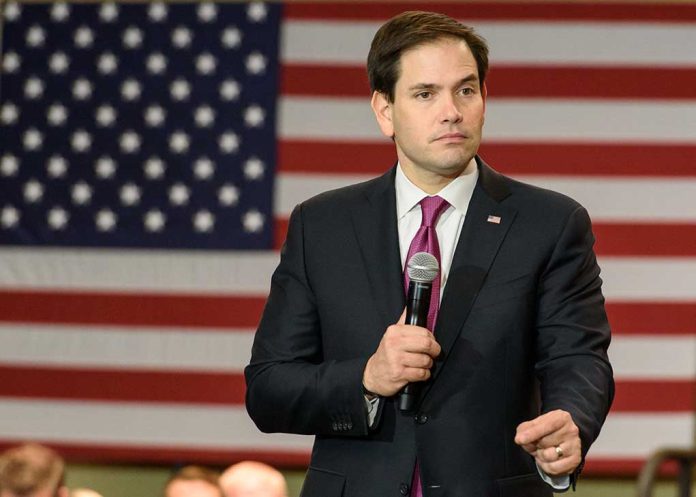
The United States has abandoned its role as chief mediator in the Ukraine-Russia conflict, leaving both nations to determine their own paths forward amid escalating violence and diplomatic failures.
Key Takeaways
- Secretary of State Marco Rubio warned that the US would end mediation unless Russia and Ukraine present “concrete proposals” to end the conflict.
- Vice President J.D. Vance has described the war as a stalemate, indicating the US will no longer expend political capital on unproductive negotiations.
- Russia proposed a temporary three-day ceasefire while Ukraine’s President Zelenskyy demanded a 30-day comprehensive cessation of hostilities.
- The Trump administration is prioritizing domestic issues, leaving European powers to take greater responsibility for regional security.
- The US withdrawal creates a significant vacuum in peace efforts with no clear international mediator ready to step in.
America Steps Back from Peace Efforts
The United States has officially withdrawn from its position as lead mediator in the ongoing Ukraine-Russia conflict. The announcement came following months of stalled negotiations and intensifying hostilities between the warring nations. The decision marks a significant shift in American foreign policy under the Trump administration, which has increasingly signaled its intention to focus on domestic priorities rather than international conflicts with no clear resolution in sight.
Secretary of State Marco Rubio delivered a direct message to both Kyiv and Moscow, “We are now at a time where concrete proposals need to be delivered by the two parties on how to end this conflict,” stated Rubio. State Department spokeswoman Tammy Bruce reinforced this position, adding, “How we proceed from here is a decision that belongs now to the president. If there is no progress, we will step back as mediators in this process.”
The US will no longer mediate Ukraine-Russia peace talks. State Dept. says it’s up to both sides to find solutions. VP Vance warns the war won’t end soon, urging direct talks. This comes after Russia rejected a US proposal and Ukraine opposed recognizing Russian annexations. pic.twitter.com/1bq6KwVYFs
— Wayne DuPree (@TheDupreeReport) May 2, 2025
Competing Peace Proposals Reveal Deep Divisions
The immediate catalyst for the American withdrawal appears to be the substantial gap between Russian and Ukrainian positions on how to achieve peace. Russia declared a temporary three-day truce from May 8-10 to coincide with World War II victory celebrations, a proposal Ukrainian President Volodymyr Zelenskyy immediately criticized as a manipulation tactic designed primarily to benefit Moscow’s propaganda efforts rather than advance genuine peace.
Instead, Zelenskyy has called for an immediate, full, and unconditional ceasefire lasting at least 30 days. “We all want this war to end in a fair way – with no rewards for Putin, especially no land,” emphasized Zelenskyy. The stark difference between these positions has frustrated American diplomats who have spent months attempting to bring the sides closer together.
Trump Administration’s Shifting Focus
Vice President J.D. Vance has been particularly vocal about the administration’s changing attitude toward the conflict, describing it as a stalemate and suggesting that “The U.S. cannot force peace if the warring parties refuse to compromise.” This position represents a marked departure from previous administrations’ approaches to international conflicts.
The Trump administration had earlier criticized Ukrainian President Zelenskyy for what they perceived as ingratitude for American support. Trump himself has maintained communication channels with Russian President Vladimir Putin, even publicly urging him to stop after a deadly missile attack on Kyiv devastated civilian infrastructure. Despite these interventions, the diplomatic impasse has only deepened.
A Diplomatic Vacuum Emerges
The American withdrawal creates a significant vacuum in international peace efforts. The US had previously outlined a “framework proposal” for peace and urged both sides to work from it as a starting point. Without American leadership, no clear alternative mediator has emerged to guide negotiations between the increasingly entrenched positions of Russia and Ukraine.
European nations, which have their own complex relationships with both Russia and Ukraine, now face increased pressure to step forward in mediating the conflict. The Trump administration has made it clear that European powers should take greater responsibility for security issues in their region, consistent with the president’s “America First” approach to foreign policy.
Meanwhile, fighting continues to intensify. Ukraine recently ordered evacuations in the Dnipropetrovsk region due to advancing Russian forces, and ongoing Russian attacks on Ukrainian energy infrastructure have further complicated civilian life in the war-torn country. Without a credible peace process, military escalation remains a dangerous possibility.
Sources:
US threatens to end mediation if Russia, Ukraine fail to offer ‘concrete proposals’
US to step back as mediators in Russia, Ukraine war if there is no progress: State Department
U.S. withdraws as mediator in Ukraine-Russia war



